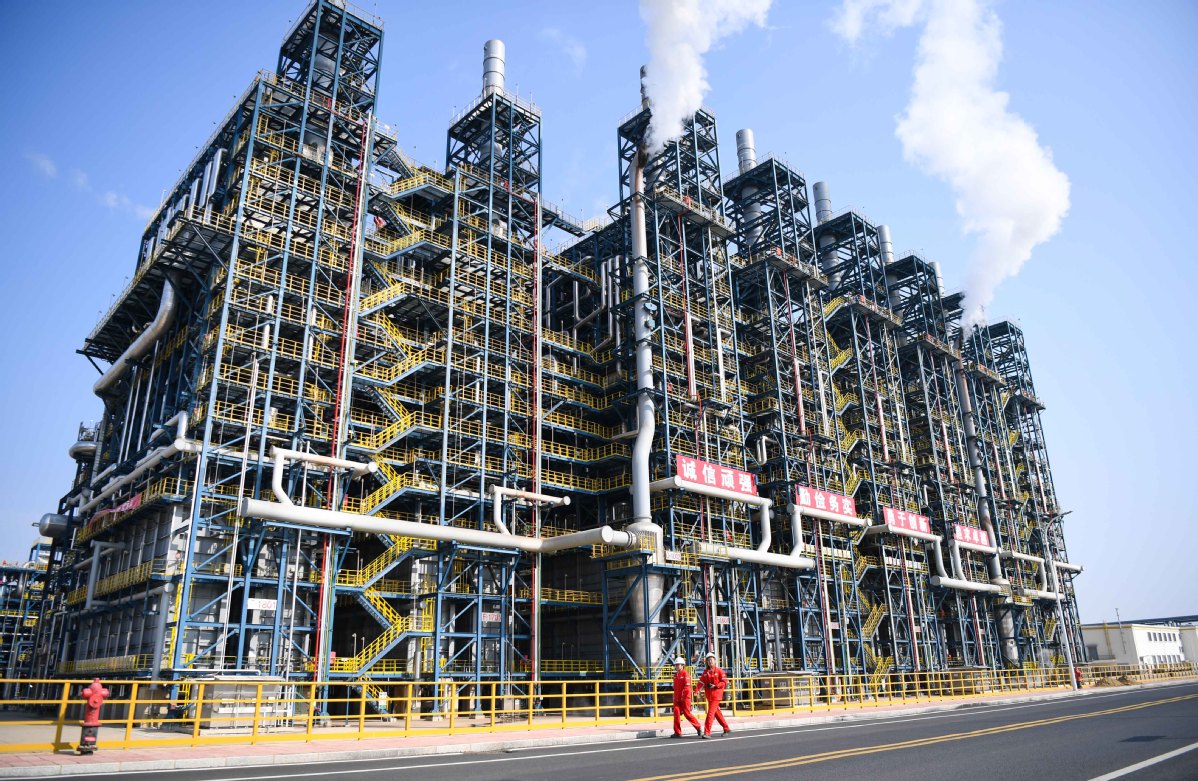
Integrated refinery facilities of Sinopec Guangdong Oil Products Co go into operation in Jieyang, Guangdong province, in March. [Photo/Xinhua]
Accelerating energy transformation and innovation is crucial for achieving high-quality development in China's petroleum and chemicals industry, and refiners should embrace breakthrough initiatives to better navigate the transition, said industry insiders.
"The petrochemical industry must step up supply-side structural reforms while focusing on the large domestic market to better prepare itself against external uncertainties," said Li Shousheng, chairman of the China Petroleum and Chemical Industry Association.
The petroleum and chemical industry, both major consumers of energy and significant emitters of carbon dioxide, faces challenges as well as opportunities in transitioning toward green and low-carbon practices, Li said during the 2024 Petrochemical Industry Development Conference held in Beijing on Tuesday.
Enhancing innovation capability is also fundamental to optimizing product and industrial structures, especially after the sector saw revenue and profit declines last year, he said.
The petrochemical sector's annual operating income fell 20.5 percent year-on-year to 15.95 trillion yuan ($2.2 trillion) in 2023, while total profits were also down 20.5 percent year-on-year to 873.36 billion yuan, official data showed.
The industry has made significant advancements in technical innovation during the 14th Five-Year Plan period (2021-25), he said.
These include the drilling of a super-deep borehole in Northwest China's Xinjiang Uygur autonomous region that has reached 10,000 meters, a breakthrough in the country's deep-earth exploration, as well as China's independently designed and built deep-water submarine jacket platform, the largest of its kind in Asia.
However, considerable gaps still need to be filled, Li added.
"In key areas of the national economic strategy, for example, such as high-end specialty chemicals, new environmental protection technologies, and life pharmaceutical technologies, there remains a significant disparity compared to advanced countries and the industry needs to significantly accelerate and deepen institutional reforms to bridge these gaps," he said.
The chemical industry faces structural shortages in high-end products represented by new chemical materials and high-end fine chemicals. Some key chemical markets lack competitiveness, and there is insufficient reserve of forward-looking technologies and leading products for the future, he said.
While the country's goals of achieving carbon neutrality before 2060 will exert pressure on its refinery sector, energy transition efforts will also broaden opportunities for those who capture growing demand for petrochemicals and are willing to adjust and modify their production modes, said Lin Boqiang, head of the China Institute for Studies in Energy Policy at Xiamen University.
China's pursuit of carbon neutrality will bring numerous opportunities to refiners that are willing and prepared to evolve, Lin said.
While the carbon peak and neutrality goals might bring many refiners difficulties, it is believed several of those who succeed in seizing opportunities will thrive amid the challenges, he said.
According to the China Petroleum and Chemical Industry Association, focused investment also serves as a crucial growth factor for both individual enterprises and entire industries looking toward the future.
In 2022, the industry witnessed a remarkable increase in investment capacity, with total investment reaching 2.6 trillion yuan, a 14.8 percent growth compared to 2.3 trillion yuan in 2021.
Allocating capital effectively in high-end, differentiated and green chemistry domains, as well as in empowering areas such as intelligent systems, big data and frontier technologies, including investments in overseas markets participating in the Belt and Road Initiative, poses a significant challenge to the petrochemical industry's precision investment capabilities, said Li.
Fu Xiangsheng, vice-president of the China Petroleum and Chemical Industry Association, said a significant number of investments has been geared toward expanding scale and increasing output in the past few years, with a limited proportion of these allocated to structural optimization and high-end advancements.
The disproportionate focus on sheer scale has led to overcapacity, and reevaluation of strategies is needed to achieve a more balanced and sustainable industry landscape, he said.
zhengxin@chinadaily.com.cn